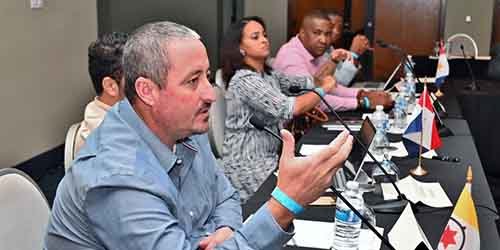The site Koninkrijksrelaties reports that the BES summit on Sint Maarten has turned out to be a complete fiasco for the delegation of Bonaire. After 3 long days of meetings, the delegations of St. Eustatius and Saba refused to sign the final declaration prepared by Bonaire. The more than 20 persons Bonairean delegation led by Daisy Coffie (M21) left disappointed.

Bonaire aimed to formalize the cooperation of the 3 islands by entering into a joint arrangement, with the idea of being stronger together in the negotiations with The Hague. Statia and Saba agree with this in principle but do not feel at all like to be used by (the coalition parties of) Bonaire.
In particular, the PDB party seems to be aiming for a tough confrontation with the Ministry of the Interior and Kingdom Relations. For the same reason, it was also not possible to reach an agreement during the summit to adopt a joint position on the modernization of the WoIBES and FinBES proposed by State Secretary Van Huffelen. Bonaire’s requirements are considered too extreme on the other islands — even by Statia — and therefore unachievable.
One person involved states that Bonaire asserted itself as Curaçao did in the time of the Netherlands Antilles. There was amazement at the size of the delegation from Kralendijk: the entire Island Council, all three deputies, the island secretary, the clerk plus almost a dozen advisors. There was also grumbling about the summit’s organization, which was in the hands of Bonaire. For example, the participants received the documents, often ‘prepared’ by Bonaire, delivered far too late.
Behind the scenes, Deputy Clark Abraham tried to salvage what could be saved, but the delegations of Statia and Saba kept their backs straight. The proposal to award members of the Island Councils a salary as if it were a full-time job also failed to tempt them to sign the final declaration. The depth of the distrust towards Bonaire is underlined by the refusal of Statia and Saba to station a joint BES representative in The Hague. They each want their own emissary.
How Bonaire is trying to impose its ideas for a ‘cooperative body’ on Statia and Saba has aroused resentment among those two. In the ‘final draft’ of the Island Ordinance ‘Common Regulation Bonaire, Saba and St. Eustatius 2024’, Bonaire provides itself with a dominant role to negotiate on behalf of the other islands with, among others, ministries.
The document has been so widely criticized that it has not been possible to produce a version that is acceptable to all delegations. On the windward side, it can be heard that Bonaire tries to draw too much power to itself. Bonaire believes that Statia and Saba are slowing down progress, among other things by providing input too late.
Viewpoints vary in almost every passage, including trivialities such as the order in which the islands are mentioned. But most suspicion is directed at Bonaire’s desire to set up an entirely new organization under the title ‘Caribbean Coordination Council’. According to the proposal, under the leadership of a ‘secretary-general’ to be appointed by Bonaire, it will have a civil service of ‘at least’ 9 full-time employees, offices on all three islands, with rather far-reaching powers to act on behalf of the islands and its own budget, 60% of which will be borne by Bonaire, 30% for Statia and 10% for Saba.
The general board should consist of all island council members, who in turn will appoint an executive board. To get Statia and Saba excited about this setup, they are allowed to provide the first presidents for both bodies. The Secretary-General and his staff are guaranteed jobs. If the cooperative body is dissolved, they can claim an appointment with a public entity of their choice.
Advisors have pointed out that there are constitutional flaws in the concept. Although the ‘cooperation body’ is intended to facilitate the Island Councils, it is — if it is up to the drafters of the draft regulation — also at the service of the Executive Councils. Contrary to the principle of dualism, they are even given the power to decide to leave the partnership before the Island Council. As an aside, the island that steps out will have to continue to pay for the maintenance of the service for years to come. There is also a mixture of responsibilities in other areas. This also applied to the summit itself: Commissioners actively participated in the meeting.
Statia and Saba’s delegates feel they have been taken by surprise. They only received the ‘final concept’ the evening before the start of the BES summit and, although the regulation states that the languages of the cooperation body are English, Papiamento, and Dutch, there was only a Dutch version for them.

 Saba News News and Information from Saba Island, Dutch Caribbean
Saba News News and Information from Saba Island, Dutch Caribbean
